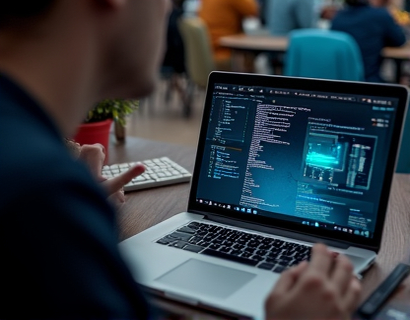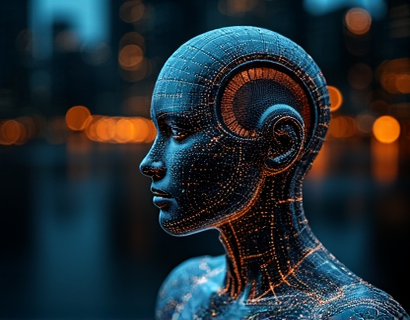Crypto and AI: Transforming Digital Engagement in the Modern Ecosystem
The integration of cryptocurrency and artificial intelligence (AI) is revolutionizing the digital landscape, creating a new paradigm for user engagement and interaction. This transformation is not just about technological advancements but also about redefining how we connect, transact, and experience digital services. The convergence of these two powerful technologies is giving rise to innovative solutions that are reshaping the tech ecosystem, enhancing user experiences, and driving unprecedented growth and connectivity.
The foundation of this transformation lies in the unique properties of blockchain technology, which underpins cryptocurrency. Blockchain's decentralized, transparent, and secure nature provides a robust framework for building trust and ensuring integrity in digital interactions. When combined with AI, which excels in pattern recognition, predictive analytics, and automation, the potential for creating seamless and intelligent digital experiences becomes immense.
Enhancing Security and Trust
One of the most significant impacts of merging crypto and AI is the enhancement of security and trust in digital platforms. AI algorithms can detect and mitigate fraudulent activities by analyzing patterns and anomalies in real-time. This capability is crucial in the crypto space, where security breaches can have severe consequences. By integrating AI-driven security measures, platforms can offer users a higher level of protection, fostering greater confidence and adoption.
Moreover, blockchain's inherent transparency ensures that all transactions are recorded and verifiable, reducing the risk of fraud and increasing trust among users. This combination of technologies not only secures transactions but also builds a transparent and accountable ecosystem, which is essential for the widespread adoption of digital currencies and decentralized applications.
Personalized User Experiences
AI's strength in personalization is another key factor driving the transformation of digital engagement. By leveraging machine learning algorithms, platforms can analyze vast amounts of user data to understand preferences, behaviors, and needs. This insight allows for the creation of highly personalized experiences, from tailored content recommendations to customized product offerings.
In the context of cryptocurrency, AI can optimize wallet management, investment strategies, and transaction processes. For instance, AI-powered bots can execute trades based on predefined criteria, adapting to market conditions in real-time. This level of automation and personalization not only enhances user convenience but also improves decision-making and investment outcomes.
Smart Contracts and Automated Processes
Smart contracts, a cornerstone of blockchain technology, are being augmented by AI to create more sophisticated and efficient automated processes. Smart contracts are self-executing contracts with the terms directly written into code. When combined with AI, these contracts can adapt to changing conditions and execute complex logic with greater precision and speed.
For example, in supply chain management, AI-enhanced smart contracts can monitor and verify each step of the process, ensuring compliance and efficiency. In finance, they can automate trading, settlements, and compliance checks, reducing the need for intermediaries and lowering transaction costs. This synergy between smart contracts and AI is paving the way for more autonomous and reliable digital systems.
Decentralized Finance (DeFi) and AI
The DeFi space is one of the most exciting areas where crypto and AI intersect. DeFi platforms offer a range of financial services, from lending and borrowing to trading and yield farming, all built on blockchain technology. AI can significantly enhance these services by providing advanced risk assessment, fraud detection, and portfolio optimization.
AI algorithms can analyze market data and user behavior to predict trends and optimize investment strategies. This can lead to more informed decision-making and better risk management for users. Additionally, AI can help in creating more efficient and user-friendly DeFi interfaces, making these complex financial tools accessible to a broader audience.
Enhancing Customer Support and Service
Customer support is a critical aspect of any digital platform, and the integration of AI in this domain is transforming the way support is delivered. AI-powered chatbots and virtual assistants can provide 24/7 support, handling a wide range of queries and issues with high efficiency. These AI systems can understand natural language, learn from interactions, and improve over time, offering a more human-like experience.
In the crypto space, where technical complexity can be a barrier for many users, AI-driven support tools are invaluable. They can guide users through complex processes, explain technical concepts in simple terms, and resolve issues quickly. This not only enhances user satisfaction but also reduces the burden on human support teams, allowing them to focus on more complex tasks.
Data Analytics and Insights
Data analytics is another area where the combination of crypto and AI is making a significant impact. The vast amounts of data generated by blockchain transactions and user interactions can be harnessed using AI to derive meaningful insights. These insights can inform business strategies, improve product development, and enhance user engagement.
For instance, AI can analyze transaction patterns to identify trends and behaviors, helping platforms to tailor their services to meet user needs more effectively. In the realm of marketing, AI-driven analytics can optimize campaign performance, target the right audience, and measure the impact of various strategies with precision. This data-driven approach ensures that resources are used efficiently, leading to better outcomes and higher returns.
Challenges and Considerations
While the integration of crypto and AI offers numerous benefits, it also presents several challenges that need to be addressed. One of the primary concerns is the regulatory landscape. The crypto space is still evolving, and regulations vary widely across different jurisdictions. Ensuring compliance with these regulations while leveraging AI technologies requires a careful and proactive approach.
Another challenge is the technical complexity involved in integrating these technologies. Developing robust and secure systems that can handle the scale and complexity of modern digital platforms is no small feat. It requires a skilled workforce and significant investment in research and development.
Privacy is also a critical issue. While blockchain's transparency is a strength, it can also raise concerns about user privacy. AI can help mitigate these concerns by implementing advanced encryption and anonymization techniques, but it is essential to strike the right balance between transparency and privacy.
Future Prospects
Looking ahead, the future of crypto and AI is bright, with numerous opportunities for innovation and growth. As technology continues to advance, we can expect even more sophisticated applications of AI in the crypto space. For instance, the development of AI-driven decentralized autonomous organizations (DAOs) could redefine governance and decision-making in decentralized ecosystems.
Moreover, the integration of AI with other emerging technologies, such as the Internet of Things (IoT) and 5G, will further enhance the capabilities of digital platforms. The combination of these technologies can lead to more interconnected and intelligent systems, driving new levels of convenience and efficiency.
In conclusion, the merging of cryptocurrency and AI is transforming digital engagement in profound ways. By enhancing security, personalizing user experiences, automating processes, and providing valuable insights, these technologies are reshaping the tech ecosystem. As the landscape continues to evolve, the potential for innovation and growth remains vast, offering exciting opportunities for tech-savvy individuals and organizations alike.










































